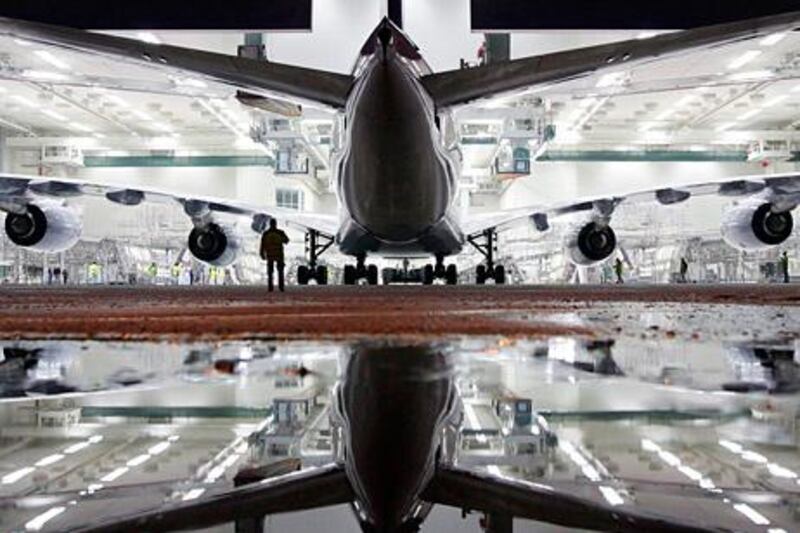Lufthansa is looking increasingly isolated as fast-growing Arabian Gulf airlines are pushing into the European market with alliances and stake purchases.
The German national carrier, Europe's largest airline by numbers of passengers, has steadfastly resisted cooperation with rivals based in the Gulf and has lobbied hard to restrict the number of slots they have at German airports.
Lufthansa argues that they enjoy an unfair competitive advantage because their expansion is being bankrolled with state oil revenues.
But other European airlines have decided to take what promises to be a more successful approach, and one that Lufthansa in the end is unlikely to be able to resist: if you can't beat them, join them.
Two major announcements this week made that plain and mark a strategic setback for Lufthansa's chief executive Christoph Franz, say analysts.
Air France-KLM struck a code-sharing deal with Etihad and with Air Berlin, the second-biggest German airline, giving the Abu Dhabi carrier increased access to Europe and offering its partners lucrative long-haul routes to the Middle East and Asia.
Etihad, which holds 29.21 per cent of loss-making Air Berlin, said that the deal would be the first phase of a much larger strategic partnership.
And Qatar Airways became the first of the three big Gulf airlines to sign up to a global airline alliance when it joined Oneworld, which includes British Airways and American Airlines.
"It's clear that this development isn't to Lufthansa's advantage and I wouldn't rule out that Lufthansa might be contemplating a similar move at some stage," Johannes Braun, an airlines analyst at Commerzbank, told The National.
"But on the other hand, Air France and Air Berlin are engaging in this cooperation from a position of weakness. In financial terms, Lufthansa is still in a much stronger position than those two airlines."
But like the other major European carriers, Lufthansa is being squeezed by competition from both ends of the market.
Budget rivals such as EasyJet and Ryanair are eating into its European short-haul business and Gulf players are taking market share in the profitable long-haul segment.
Lufthansa is now the last big European airline that does not have a cooperation deal with a Middle East airline.
True, the German carrier has a dense network of partners in its Star Alliance, the world's largest global airlines alliance. But it will have to perform the unenviable feat of cutting costs while matching the high standards of Gulf carriers if it wants to keep up with ever-tougher competition.
Buffeted by soaring fuel prices, weak demand because of the European debt crisis and burdens from new national taxes on air travel, analysts say European airlines have little choice but to open up to Gulf carriers.
Lufthansa's operating profit fell almost 20 per cent to €820 million (Dh3.9 billion) last year. In August, it reiterated its forecast that profits this year will shrink to a "mid-three-digit million" euro figure.
Lufthansa is trying to cut costs in a plan to improve annual earnings by €1.5bn by 2014. But last month's pay strike by cabin crew, which led to the cancellation of more than 1,000 flights and is reported to have cost Lufthansa €100m, shows how difficult that process is.
On Thursday, Mr Franz announced the establishment of a new low-cost airline under the brand of Lufthansa's Germanwings subsidiary that will combine the carrier's European and German domestic routes from next year.
But that leaves the long-haul problem. Here, there is speculation that despite all the hostile rhetoric about unfair competition, Lufthansa may eventually bury the hatchet with Emirates Airline and seek an alliance.
Lufthansa's options are running out. Its mantra that Gulf airlines must not be given more slots at German airports is having less impact in Berlin's corridors of power. After all, Emirates is helping to secure thousands of European jobs, including jobs in Germany, with its orders for Airbus planes.
Lufthansa does not have the financial muscle to keep up with the likes of Emirates. Compare demand for the Airbus A380, the world's largest passenger jet and a symbol of airline prestige: Lufthansa has placed orders for 17; Emirates has ordered 90 and has won friends in Europe as a result.
Gulf airlines simply offer too many advantages for Lufthansa to be able to ignore for much longer. The airports are modern and can operate around the clock, free of the tight noise restrictions Lufthansa faces at its main hub in Frankfurt. And they are well located geographically between Europe and the booming markets of the Far East.
For the time being, Lufthansa is likely to keep on trying to stop those gleaming Gulf-purchased A380s from getting any more landing slots.
But change can come rapidly.
"The market is so dynamic, every constellation is possible," one unnamed senior Lufthansa executive told the German daily Financial Times Deutschlandlast week.





